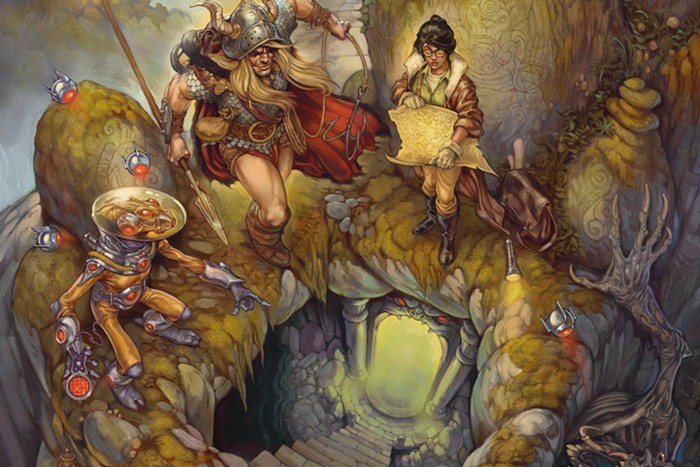In a just world, you'd be reading short fiction by local author Ann Pancake in the New Yorker. Her stories are exactly the kind of literary fiction that the New Yorker should want to publish: beautifully written, expertly constructed—an intriguing balance of vivacity and discipline. Instead, you'll find her work in literary magazines and the books she irregularly publishes. Seven years passed between her debut novel, Strange as This Weather Has Been, and her second short-story collection, Me and My Daddy Listen to Bob Marley (Counterpoint, $24), which was released this month.
Prestigious outlets like the New Yorker should not be held up as the be-all and end-all of literary aspirations, of course. Their validation means less every year. But my point in beginning on such a dour note is that Pancake deserves wider recognition, the kind of literary fame that writers like E. Annie Proulx enjoy. She's one of Seattle's keenest literary talents, and her work demands to be seen by as many readers as possible.
In person, Pancake seems happy to be read at all. She's polite and generous in conversation, with an Appalachian accent that shifts from barely perceptible while making small talk to something a little bit stronger when discussing her native West Virginia. Though one of the stories in Bob Marley is set in Seattle, West Virginia is the blood and bones of her fiction. She admits to feeling "a responsibility to the land and the culture," of representing a "very exploited" and "very impoverished area."
After she graduated from West Virginia University, Pancake admits she "thought there was nothing to write about in West Virginia," so she taught English as a second language in Japan for about half a decade, eventually getting her master's degree at Chapel Hill and coming to University of Washington for her PhD in English. After trying to teach full-time and deciding it was too "hard to get any writing done" that way, she moved back to Seattle and now works part-time at Pacific Lutheran University. "If I'm not going to be in West Virginia, I'm going to be in Seattle," she says, but ultimately she imagines she'll likely return home.
Pancake's fiction is intensely focused on the qualities that make West Virginia unique: the environmental pillage of strip-mining and hydrofracking, crushing poverty, and the beauty of Appalachia. Her writing about nature obviously comes from a place of awe; it's downright Whitmanesque. Pancake talks openly of "trying to write about the experience of divinity in the wilderness," a process she calls "ineffable by definition."
One of the gutsiest stories in Bob Marley, "Arsonists," is about a yearlong string of arsons in a town that's been left devastated by the coal industry. "Somebody started burning houses within a year after they blew up the first mountain," Pancake writes. The protagonist, Dell, can't do much but watch the town go up in smoke:
They burned regular, about once a month, the glows of the closer fires quavering Dell and Carol's window, choking them awake on their trash smoke stink. Sometimes the firefighters came. Other times Dell rushed out with the neighbors and their sorry garden hoses, trying to contain the flames. But what has stayed with him tightest, longest, is not the panic or the odor or the colors of the blaze. It's the noises. The pops of little things blowing up in the houses, the whoosh-roar of bigger, the shuddering wrenching cracks, then the crashes as roof parts cave in. It is the ripple sound of flames moving good. The "I'm coming" like sheets of canvas flapping in wind.
Do you see, in that excerpt, the ecstatic mix of beautiful tumbling words, of West Virginia dialect interjected into the narration, of imitation of the sounds of fire within the syllables of the words used to describe the fire? This is Pancake at her brawniest, not using language to tell a story, but allowing the language to become the story. Or just read the first two sentences of "Dog Song" and try not to read the rest of the story:
Him. Helling up a hillside in a thin snow won't melt, rock-broke, brush-broke, crust-cracking snow throat felt, the winter a cold one, but a dry one, kind of winter makes them tell about the old ones, and him helling up that hill towards her.
Pancake admits that she works very slowly. "I hope my next book is faster," she says. "I'm 52, it has to go a little faster now." The stories explode out of her in a loose collection of images and phrases, and then she spends a lot of time crafting them into what you'll find in Bob Marley. With writers, you usually get one or the other—the intuitive Dionysians who whip out first drafts that somehow are as close to perfection as they'll ever be, and the meticulous Apollonians who linger over every word with jeweler loupes and tweezers. Pancake is both kinds of writer at once, and that's why her stories read like nobody else's, a fusion of craft and guts.
As for that next book that had better not take too long? Pancake has done her fair share of documenting the environmental exploitation of the wilderness in her novel and in her work reporting for her sister Catherine's documentary Black Diamonds: Mountaintop Removal & the Fight for Coalfield Justice, but she says, "I think I've kind of come to an end of my desire to document destruction in my writing." And now "what I'm interested in doing is envisioning alternative futures." Whatever those futures look like, you should follow her there. ![]()



















